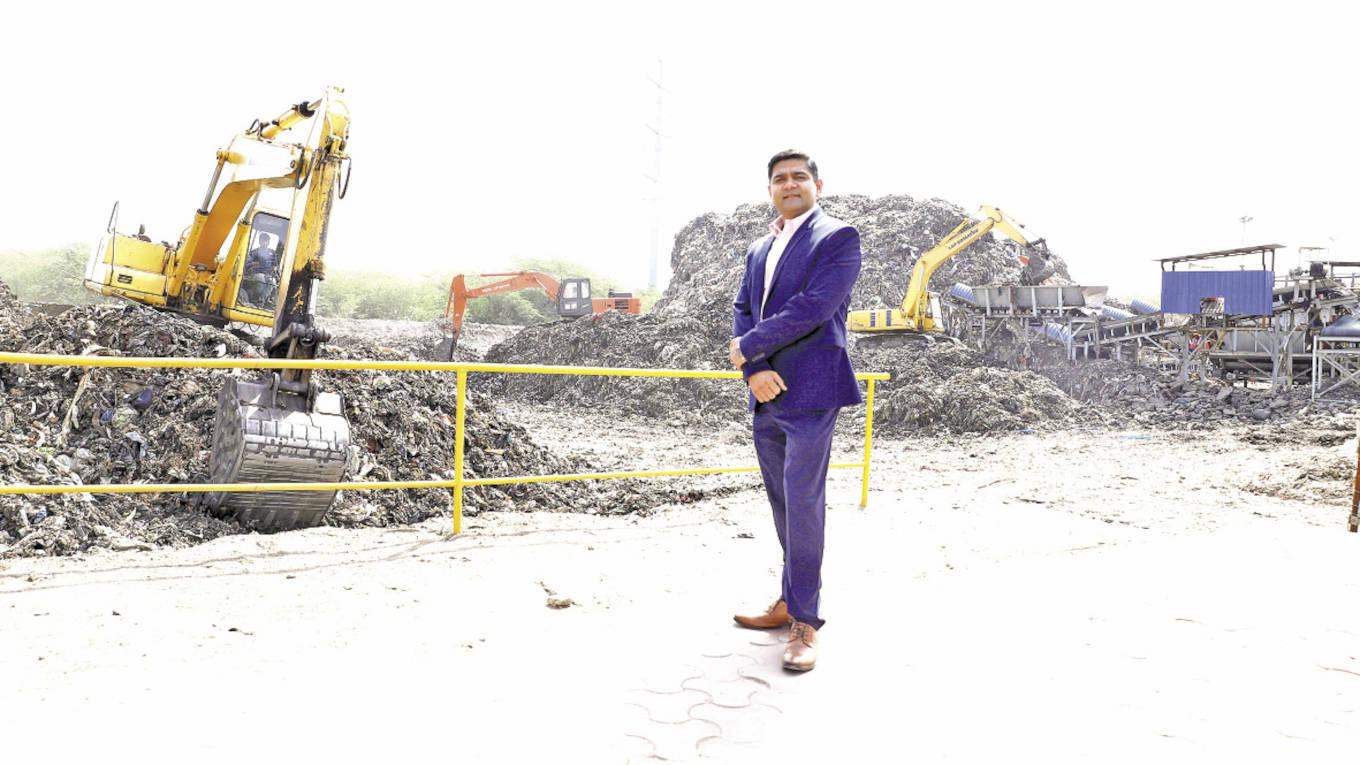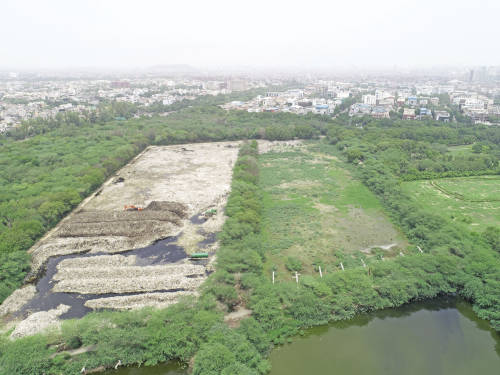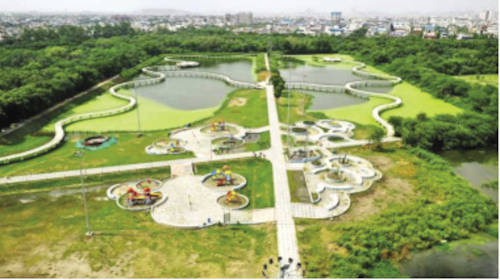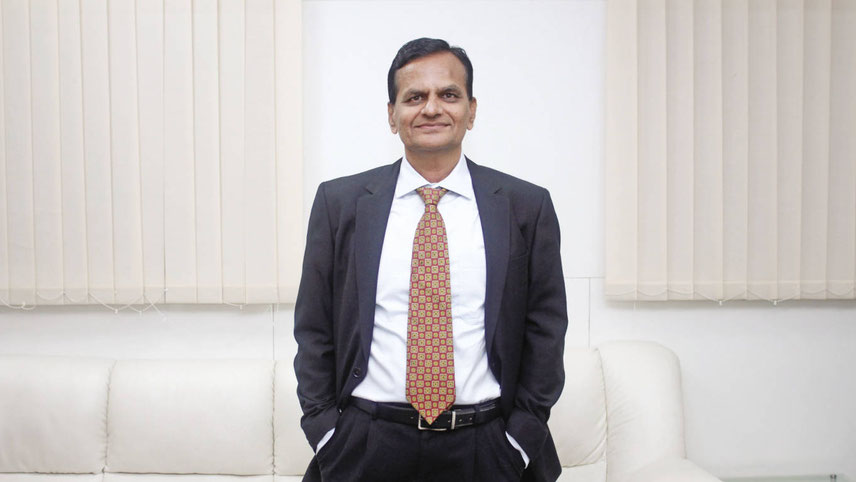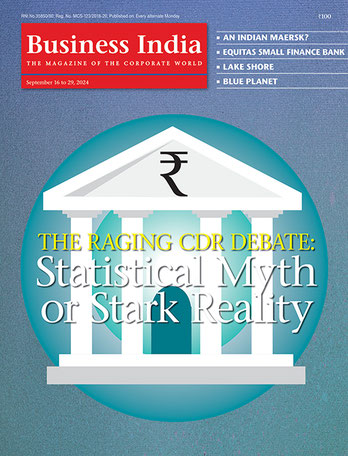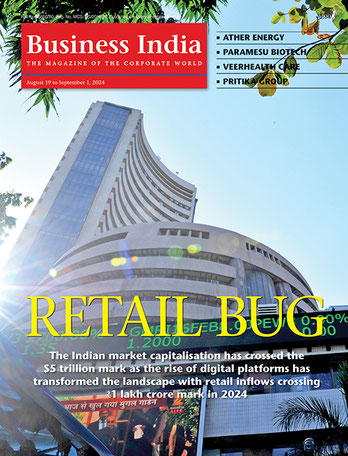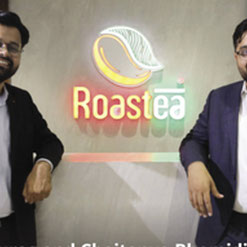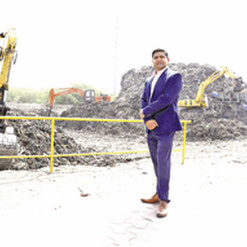-
Landfill reclamation project executed in Noida
During its seven-year-long journey, Blue Planet has developed a suite of solutions, which broadly reflects its intention of emerging as an efficient integrated player in the waste management value chain. They include organic waste solutions, agri-waste solutions, integrated MSW (municipal solid waste) solutions and waste-to-energy solutions, on the bio fuel side.
On the recovery and remediation front, it is providing services in landfill mining solutions and alternate fuel supply. Its material collection service covers the entire spectrum, ranging from municipal waste to hazardous and industrial waste, which are eventually pushed to the recycling point and further upcycling.
Those who live in Indian cities are well aware of the municipal dumpsites, which often add up to resemble huge mountains, mostly created at the outskirts or even in the middle of the city. Take the case of Delhi. It has three gigantic landfills – Ghazipur (Delhi-Ghaziabad border) border, Bhalsawa and Okhla. And the situation is no different in other leading urban settlements. In fact, it would be no exaggeration to say that, in the world’s most populous nation, where urbanisation is panning out at a rapid pace, the solid management scenario has become alarming.
As per government estimates, the total volume of waste annually generated in India is nearly 65 million tonnes, out of which MSW accounts for about 62 million tonnes. The disquieting fact is that only 22-28 per cent of waste is processed and treated (the collection figure, though, is quite high at 75 per cent). By 2031, the total volume of waste is slated to shoot up to 165 million tonnes. The low level of scientific processing of collected waste simply underlines lack of specialisation in the domain that could have created capacity and provided advanced solutions.
Aggressive moves
The regulatory changes in the waste management programmes vis-à-vis the government’s larger Swaach Bharat Abhiyan and urban rejuvenation schemes have taken a note of this gap and, therefore, provisioned for a more liberal regime paving the way for larger participation of the private sector in the PPP mode (driven by municipalities which invite private partners on a long-term lease basis).
An entity like Blue Planet has made aggressive moves in this specific space, which is believed to comprise 3,200 landfill sites nationally, with a majority of them being treated with scientific processes. And it seems to have done well with its preliminary set of landfill mining projects. “We have built Asia’s largest business as far as land filling is concerned. Till date, we have processed almost 10 million tonnes of landfills in India alone. In fact, we have developed this business in India and grown it almost three times since we started. In India, we have completed 25 projects in seven different states and given back 600 acres of land to municipalities,” Singh informs.
Some of the major sites, where Blue Planet has shown its expertise with its defining execution skills, backed by effective technological solutions, include Chennai (Perungudi dump yard in South Chennai) and Greater Noida. “Look at what we have delivered in Chennai. We cleared 1.6 million tonnes in 32 months there. It was a bird sanctuary before. We cleared 96 acres,” he further adds.
-
We have built Asia’s largest business as far as land filling is concerned. Till date, we have processed almost 10 million tonnes of landfills in India alone
Vibrant components
While landfill mining has been a successful touch-point for Blue Planet in India, the top brass exudes confidence it will soon make its mark in other domains of waste management where it has taken a position. And, among other things, this high degree of confidence also seems to stem from sound financial support from noted financial agencies. Although Singh does not specify investments that have flown into the company from prestigious PE quarters like Neev Fund, Nomura and others, the total fund raised by the company till date is estimated to be over $100 million.
In December 2023, the company had announced receiving $35 million investment from Denmark-headquartered The Investment Fund for Developing Countries (IFU). This specific investment is meant to support Blue Planet’s expansion drive in India alone. “With waste volumes estimated to more than double towards 2030, investments into innovative technologies and operations are needed,” affirms Thomas Hougaard, senior vice-president, IFU, commenting on the deal. “The waste sector has evolved over the last years, supported by better regulation and, now, provides opportunities to deliver on IFU’s impact investor mandate towards both investors and local communities”.
A remarkable element of Blue Planet’s short journey has been its spate of acquisitions. The seven-year-old firm has made 14 acquisitions so far, five of which are in India. Some of the important acquisitions, which the company has made in India, includes: Zigma Global Environ Solutions and Mahindra Waste-to-Energy Solutions. More than anything else, it is probably this deal with which Blue Planet has grabbed maximum attention in India (Blue Planet has acquired the majority stake and Mahindra group still has a presence by way of a minority stake).
Blue Planet top brass asserts these acquisitions are quite strategic, bringing new strength to the company’s portfolio. For instance, Zigma is a landfill mining specialist with propriety technology and its acquisition has certainly helped the company in expansion of its ambit in this specific segment. And this critical component added by Zigma will be used to the hilt in other geographies. Compressed bio gas (CBG) is another major domain where plenty of action is expected in India, where control of Mahindra is a critical differentiator, as it has eight CBG plants under its belt in India.
Blue Planet has a profile of 10 CBG units in the country located in Maharashtra, Andhra Pradesh, Madhya Pradesh and Tamil Nadu. But globally, its CBG portfolio is much larger and it has clear intentions of adding more CBG units to its kitty in India. “Globally, we have a portfolio of about 120 plants. They are mostly mid-sized and also includes some EPC projects, which we do on a case by case basis. We have a similar strategy in India,” Singh underlines, adding that the company again has the backing of propriety technology which can segregate up to 90 per cent of mixed waste into organic waste, which is further used for biogas production. Plus, the company is seriously eyeing at shoring up its waste collection business, a segment which it has strongly developed in Singapore, where it is counted as number two player.
-
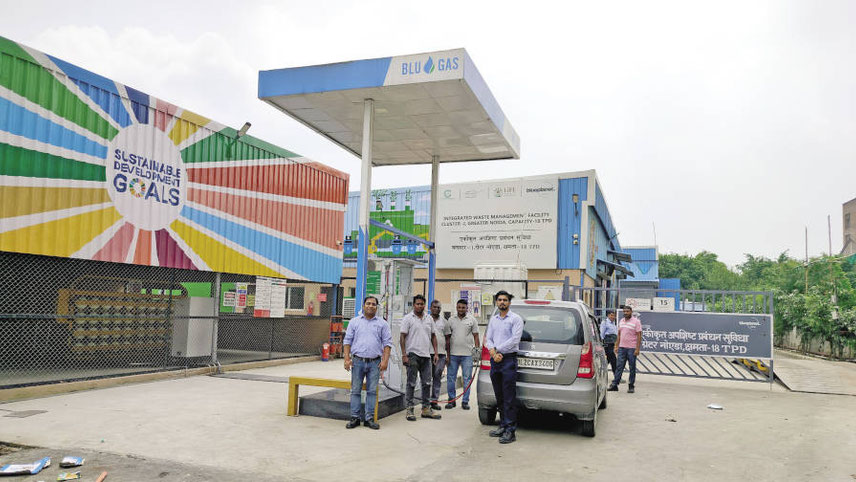
Blue Planet Greater Noida facility
“We have proprietary technology wherein we segregate 90 per cent of mixed waste for organic waste,” says Singh. “Organic waste can be converted into bio-gas which can then be converted into electricity. So, upscaling process begins here. The second bucket is technology, used for upcycling in the green energy domain. The third unit is MRF and waste collection. We are the number two player in this area in Singapore.
Though Singh does not share the financial numbers of the group, he emphasises that it is on a strong wicket and now well set to make a move in other parts of the world including Europe and APAC after firmly establishing itself in Singapore, India and Malaysia. Today, it has a spate of projects in its kitty which probably explains its growing capability to deliver bigger projects.
For instance, it is now executing a 9 MW waste to energy plant in Tuas, Singapore. And it has similar modest scale projects across its portfolio spectrum in Malaysia, the Philippines, the UK, Switzerland, etc. In India, it has a series of more prestigious projects in its pipeline which includes making a debut in the e-waste recycling segment with a large scale facility in Southern India. Currently, the company is exploring options to set up this project which is likely to have a capacity in the range of 10,000 to 20,000 tonnes per annum.
As far as Blue Planet’s stronghold segment – landfill mining – is concerned, it has now bagged a 352 acre Kodungaiyar dumpyard in Chennai (sanctioned by the Greater Chennai Corporation recently). “The second phase of the Chennai landfill is the largest project in Asia which is close to 40,00,000 tonnes. We will build it in four years,” Singh says, asserting that, as circular businesses reach a mature stage in the country, Blue Planet’s journey would skip to a more exciting orbit, as it has already created a sound base – something that became apparent to many, when Mahindra’s unit was acquired early this year.
